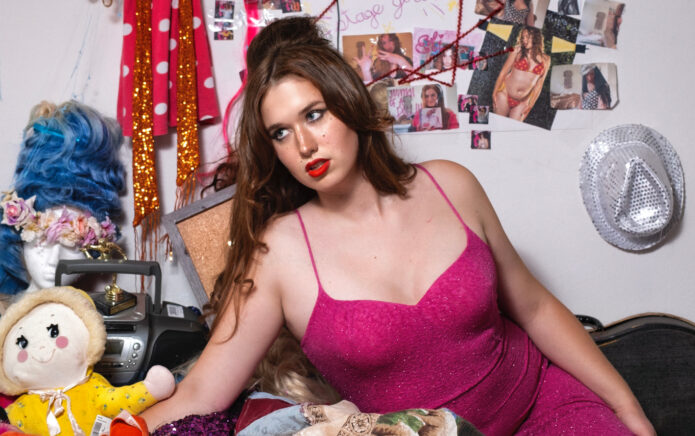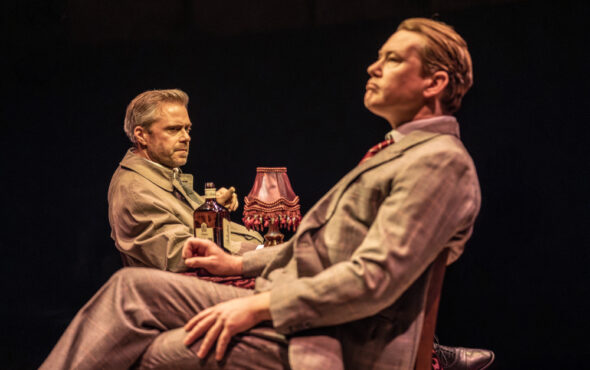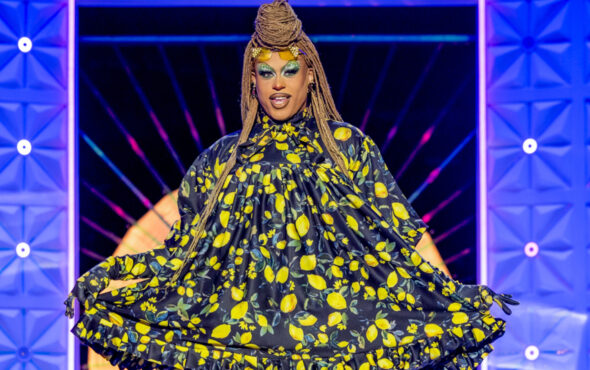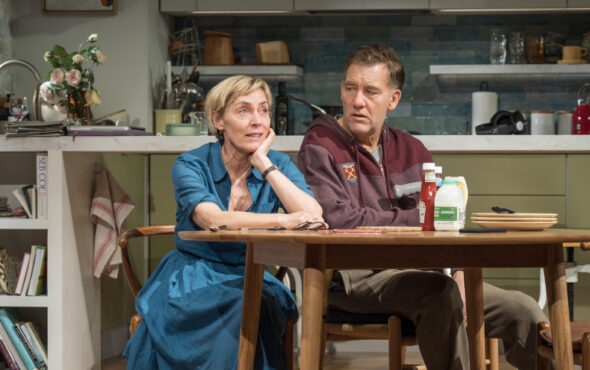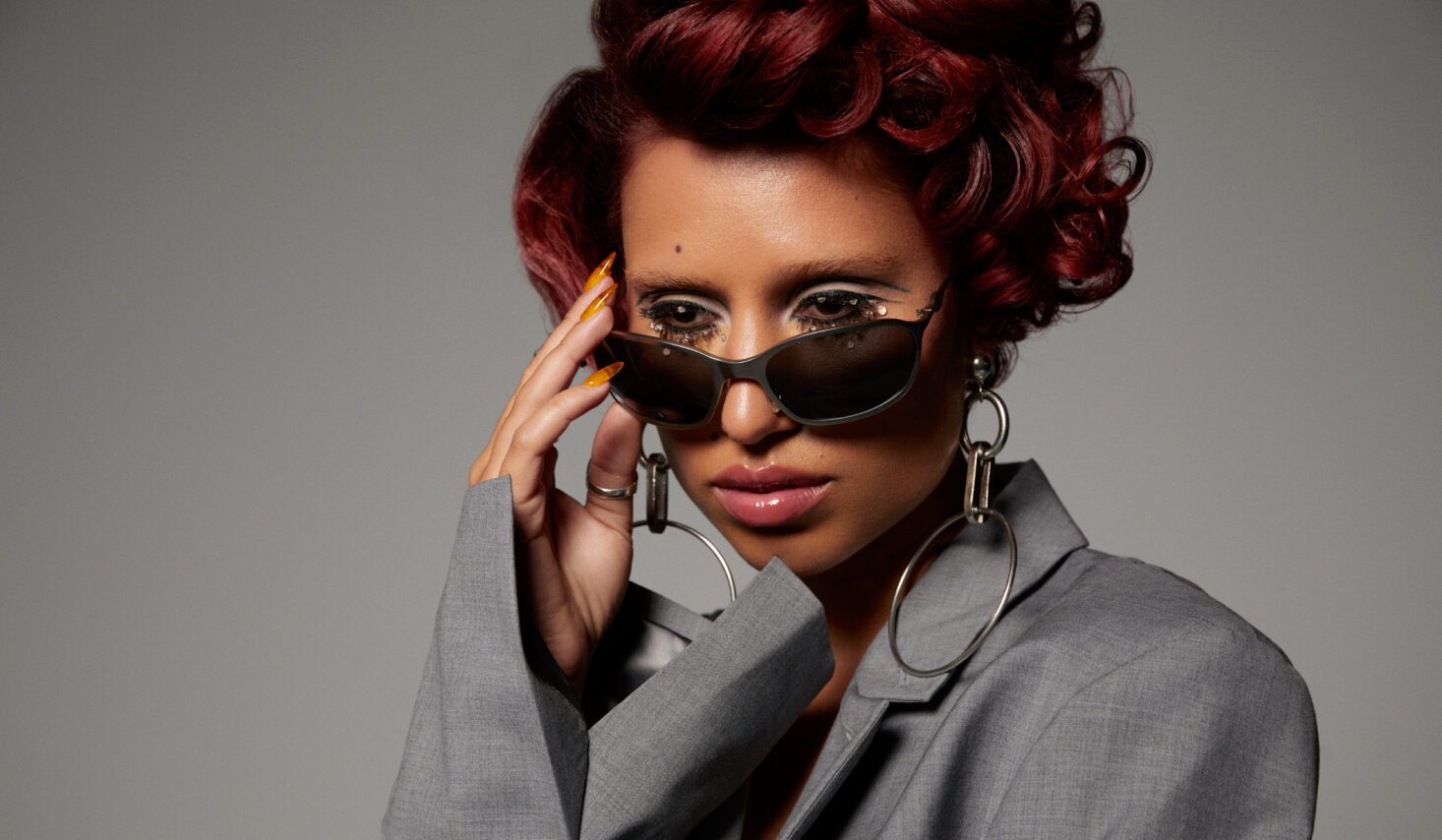
The reign of Raye has officially begun. Free from the shackles of record label politics and industry double standards, Raye has found herself on the other side as an artist in full control. Empowered and enlightened, Raye is ready to creatively exhale and tell her complete uncensored truth with her hotly-anticipated debut album My 21st Century Blues.
The album is a triumphant exploration into self discovery and recovery as Raye works through personal traumas and setbacks with raw, punchy lyrics and hypnotic melodies. The newfound independence is paying off with her brand new single Escapism, which is sitting currently at number one on Apple Music and eyeing atop 10 placement this week on the Official UK Charts.
The Croydon-raised songstress sits down with GAY TIMES to dive deeper into her newfound happiness, her creative hopes for the future and how she will never let anyone take her shine again.
How does it feel to finally have this debut album moment after dreaming and fighting for it for so long?
It does just feel beautiful, but it also doesn’t feel real, entirely. I feel like someone is going to call me up and tell me, ‘Oh, we’re moving it another two years.’ I am definitely battling with the surreal versus the real, but I’m very excited. I am also so proud of it and I think during this time with independent life, I’m reevaluating what really matters to me and who I want to be. I just know I want to put bodies of work out and this is my first one. I am about to achieve a really important goal of mine. Yeah, I am so excited.
Going independent can be both a liberating and overwhelming experience. Did you notice any changes in your approach to the music and within yourself this time around?
100%. I am such a people pleaser anyway, that’s something I’ve been working on. I think it’s important to be lovely to everyone and be kind, but not to compromise yourself and what you believe in for the sake of pleasing someone else and, I guess, I really badly got sucked into wanting validation and I wanted this love. That just meant I was compromising so many things. I think in this independent journey it’s really been about stripping away all the other things I never cared about, but I felt like I needed to care about. For me, one of those things is the integrity of the music that I am creating. I am a very deep layered, complex person. I am not a simple person. I have a lot to say, I have a lot of feelings, I like to be honest. I like to say how it is and push boundaries and break walls. I think that this independent process is definitely liberating. The music now, compared to everything before, it’s very different. This music is not created to sell or designed to make money. It’s designed to be honest and express myself. Whatever happens happens but fucking hell, it feels so good.
Euphoric Sad Songs feels like the beginning stages of what is now about to be revealed in My 21st Century Blues, in relation to the sound and complexity of the lyrics. You’ve never been afraid to get raw and really dive into your emotions, whether that’s betrayal, heartbreak or industry politics. Are there any topics that you keep to yourself?
Not on this album darling, it’s extremely personal. I wanted to have, similar to Euphoric Sad Songs, where there was a slight order to it, you feel emotions in different orders. The first emotions I was processing and dealing with that I wanted to share with this album was anger. Rage and hurt, but like red hurt, burning; being burnt and needing to blow that steam. Black Mascara was the next step in dealing with trauma, dealing with a drink spike and absolute betrayal. Medicine shows me trying to work out how to become a human again. There’s different textures coming and a lot more emotion and songs that are so personal that I will be preparing for it all. At the end of it all, I do believe that that’s what art is truly about. I have been trying to sing some of these songs on my little The Story So Far tour, but I can’t even get through them without balling into tears. It’s really real.
How do you get to that point of a transformation of the pain, where you can listen and perform the songs night after night and shield yourself from going to those dark spaces?
There are definitely some situations that are way easier to process than others for me, personally. Hard Out Here, for me now, is just a bop. I said what I said, you know what I mean? I said what I said and it feels great and it is what it is. I don’t listen to it and feel like, ‘Oh my god, how hard it was…’ I am over that. I have moved on. Ice Cream Man, for instance, I am not over that. I am not healed from that 100%. Then I have a song called Body Dysmorphia and it’s just extremely, extremely personal and I’m still processing that emotion from the best perspective than I have before, but it’s still extremely vulnerable. A lot of this album are just things that would align in the innermost part of my head that I wouldn’t talk about or share. I really do believe that when things are in the darkness they have power over you, but the second you bring them into light they lose a certain power. It turns from a weakness into a strength. I kind of think that is my plan with this album and how vulnerable and honest it is. Other people might hear it and relate to these flipping things that hold you into the darkness. It is definitely intense. I am definitely going to need therapy for the tours. It is what art is, darling.
Speaking about the tour and your performance style, you have a magnetic gift of uplifting the crowd. The songs may have heavier undertones but the energy is always euphoric. What is being on stage like for you?
It’s home. It’s a second home. Especially when it’s your own crowd, it’s just home. Sometimes I take a step back and realise I am in a space where I am so grateful. I have been working in this industry for about 10 years, since I was 14-15, and the fact that I get to call it a job and a career is just nuts. I am so blessed and I love it and I am never going to stop fighting. I am never going to stop using my platform to speak out about things I believe are wrong and things I need to change. We need to change things about songwriters because I am so sick of this and I am going to be a broken record until things change. I am giving them all the details, all the statistics, all of these things because I am empowered. I am not scared anymore. I have nothing to lose, and I feel like that when I’m on stage. When I am on stage, no one can hurt me. It’s a very beautiful feeling.
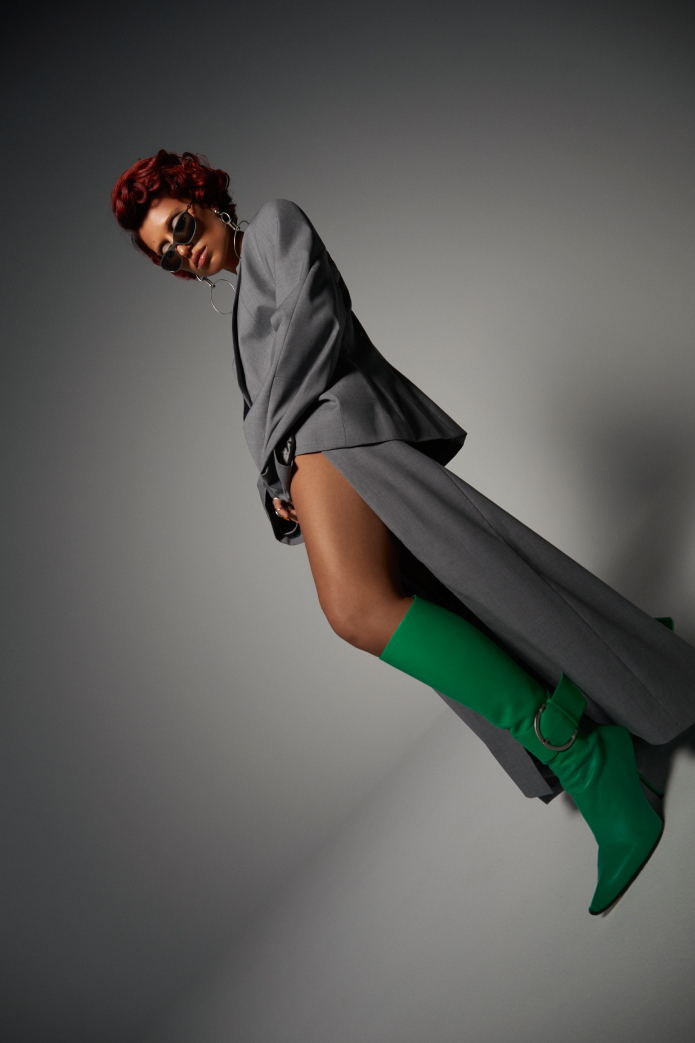
Throughout your fight for creative freedom, you’ve always held the respect of the creative, fashion and LGBTQ+ communities. How has this support and energy been channeled into the visual identity of the album? It’s looking flawless.
It has been so fun and so liberating. There are no rules. This is my favourite place to exist, where you can move and do whatever feels right or whatever sparks your imagination, whatever sets your soul on fire. These new visuals I’m putting out, it’s just so exciting. It’s the opposite of being safe. It’s the same thing I am doing with my music. Through fashion, obviously I am dying my eyebrows blonde and having all these different looks. I’ll be outside with no makeup on and no eyebrows and people look at me like, ‘What is going on?’ And I’m like ‘And?’ You know what I mean? ‘And?’ Different looks, pushing myself out of my comfort zone, feeling more confident… Just expressing myself. The LGBTQ+ community just inspires me countlessly. I am just like, ‘How do you have the confidence and strength to go out and be so fabulous?’ I need to take a leaf and I really have been. Regardless of those fears of what anyone else might think, that has just been so fun.
Your energy and music really resonates with so many people, especially the queer community. Whether they can relate word for word or find meaning in the situations you sing about, what are some wise learnings you’d want people to take away?
The biggest thing I’d love to share is: don’t let anyone steal your light. In this life, there are good people and there are bad people. In this life, there are great days and awful days. It’s how we process and choose to survive and handle that and overcome the bad days that define who we are. A lot of this life will come and try to put your light out. You can’t give them that power. In the thick of me processing everything, even across my career, there have been times when I’ve lost myself and become so bitter and so not me. So glass half empty, so hurt. Personally, I believe in forgiveness, only because it allows me to be free and be rid of all of this stuff. The biggest thing now is that I am so happy, I feel so free of anything and all of the things that were once weighing on me. I just want anyone who hears this music, who feels they can relate in some way, I hope it may be medicine to help you lift the load and find your light. Slightly cheesy, but that is my really honest message there.
As a person of colour myself, hearing you go completely full throttle on Hard Out Here was so empowering to hear. People will definitely listen and feel vindicated and know it’s okay to be human and angry. People can’t inflict pain and then control the reaction. Within your journey of empowerment and overcoming adversities, who were some of the people that pulled you out of the darkness, besides yourself?
Honestly, the process of saving me was by saving myself. Before this year, I was never on my own. I was scared to be alone. I would always have a friend sleeping over, always have breakfast with three other people. A part of being an artist is that this is seen as normal for that to be the case. When all of this stuff happened, I went through these big changes and I kind of shut myself in. I was like, ‘Who the hell am I?’ I got sober. I got really deep within myself in a really long time. I had to check myself, look at myself in the mirror, figure it out, cry. It was a real journey of self-discovery, to be honest. It was quite powerful because I was never this person. I was such a people person. I had to be that. Going away, working out who I am when no one is around, working out who I am when I’m sad and on my own and with no one to stroke my hair or pour me a drink… It was a journey of really deep individual self-discovery, but really empowering when I found myself on the other side of it.
There’s a sense of feeling reborn with any form of personal awakening. With that in mind, what was the process like when it came to revisiting former situations and maneuvering environments that held you back before?
To be honest, very humbling. There is an assumption of how you should feel and act as an artist. The idea of, if you turn up somewhere, you have to turn up in a nice fancy car. Or if you turn up to a party, you have to show up with three people. You have to look like you’re above this person and this person. The irony is, during this time of self discovery and individualism, and just realising we’re all humans and we’re all the same… Yes, expressing myself and being fabulous and feeling empowered and like I look incredible is one thing, but that doesn’t mean I am anything but a human being who just has a job that they love, and I get to write songs and perform for a living. It’s been such a transforming year for me. There’s been so many things I’ve been insecure about or there’s been these smoking mirrors I needed to uphold for the industry, for image or whatever. It’s all removing slowly. I feel more grounded than I’ve ever been for a very long time. I feel so good at the moment, I really really do.
RAYE’s debut album, My 21st Century Blues, is due for release 3 February.
